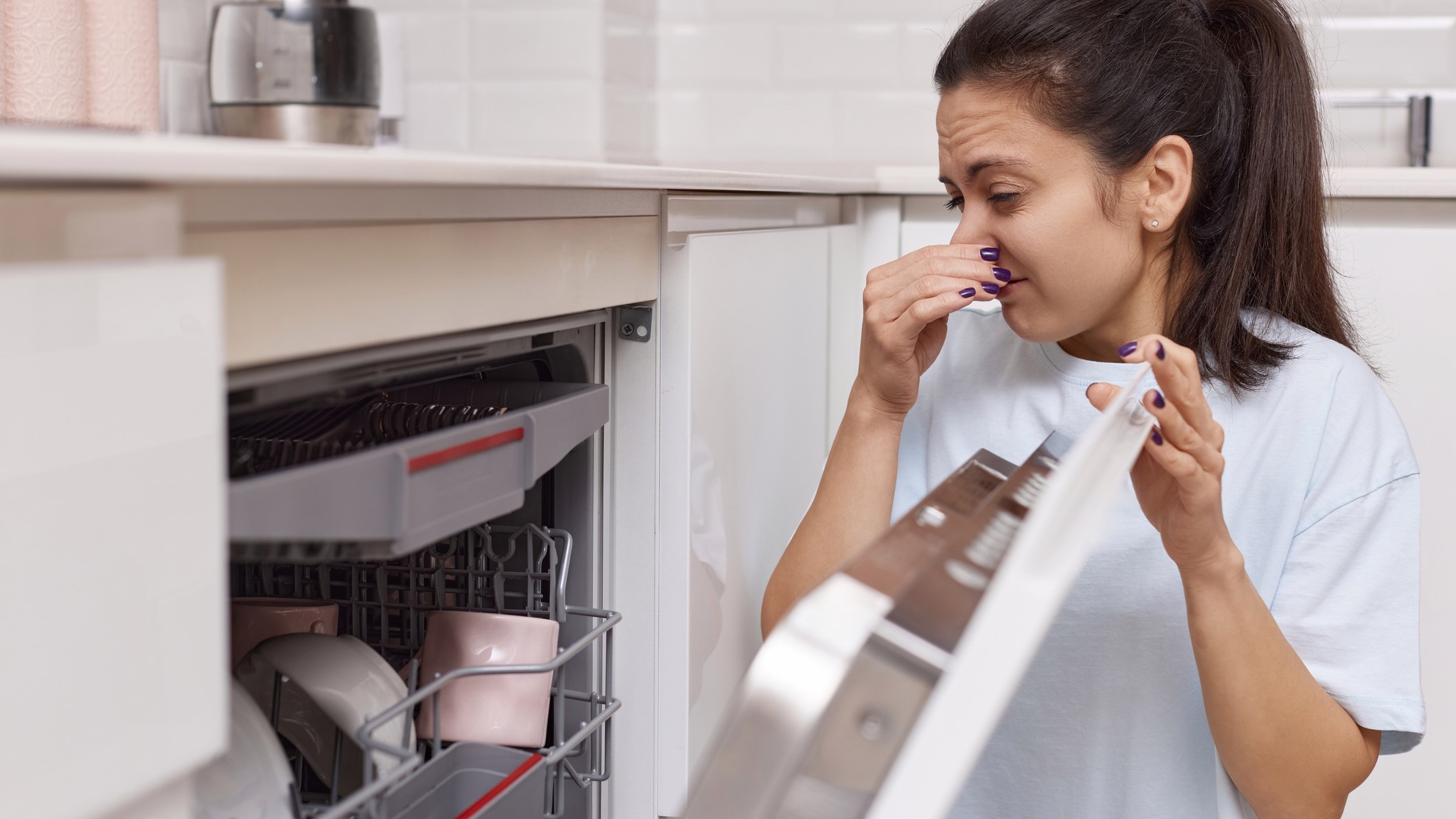Ever opened your dishwasher expecting the smell of freshly cleaned dishware, only to be greeted by a fish, eggy or musty smell?
- White vinegar
- Baking soda
- Lemon slices (optional)
- Dish soap
- Cloth or sponge
- Toothpicks
- Toothbrush
- Gloves
- Wet vac (optional)
It's not uncommon. All sorts of factors can cause unpleasant dishwasher odors, from backed-up drains and filters to everyday grease and grime. The key is knowing how to tackle them to restore your dishwasher's pleasant scent and avoid those pongy smells from returning.
I’ve got expert advice on how to eliminate those funky smells from your dishwasher using natural ingredients, as well as daily, weekly, monthly and yearly maintenance tips to keep your appliance smelling fresh and clean.
How to get rid of a dishwasher smell: quick steps
- Empty dishwasher, then turn it off and unplug it
- Soak up standing water
- Clean the filter
- Check and clean the drain
- Clear the spray arms
- Wipe down the interior
- Run a vinegar cycle
- Run a baking soda cycle
How to get rid of a dishwasher smell: step-by-step guide
1. Empty dishwasher, then turn it off and unplug it
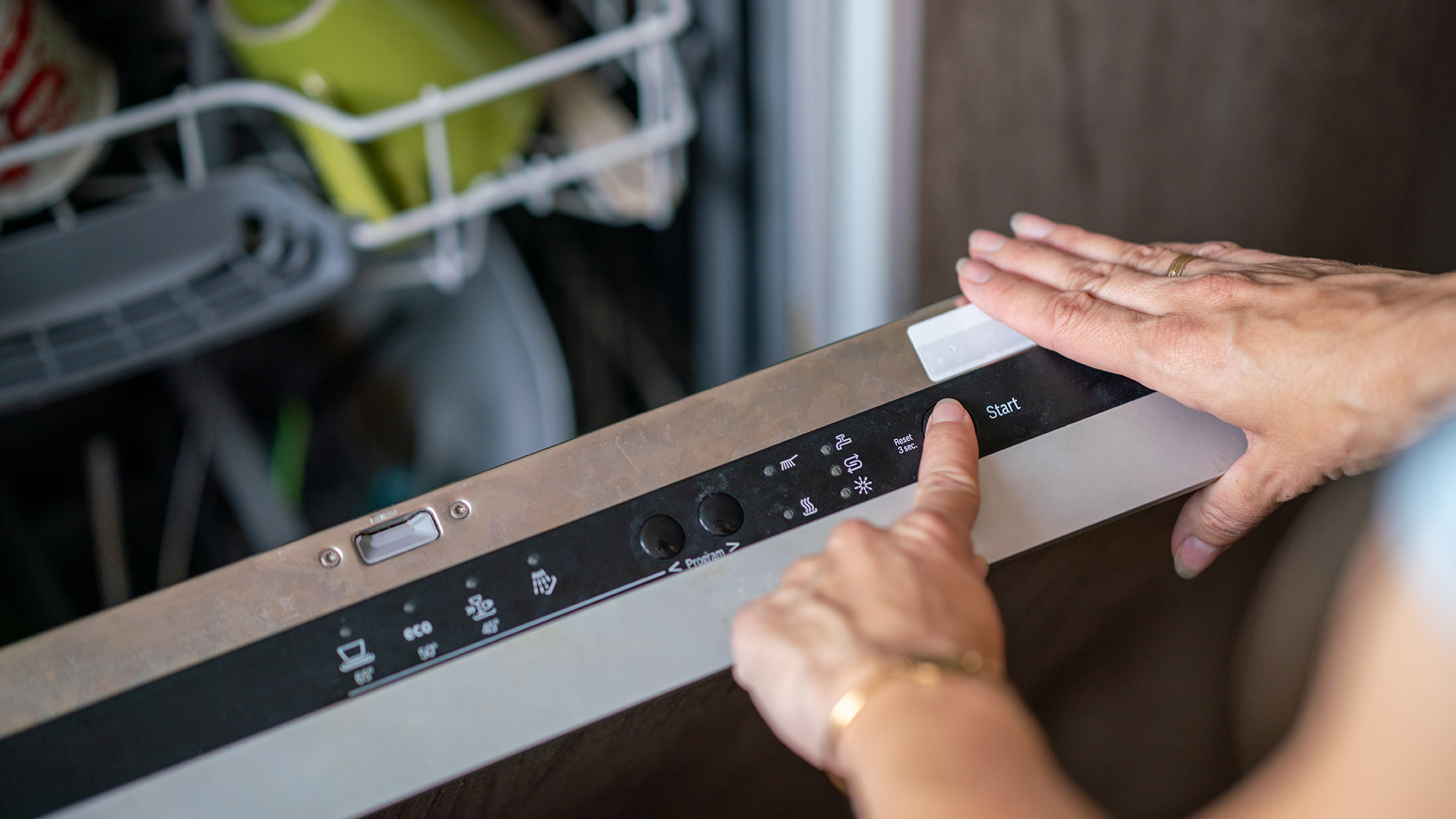
Before you start cleaning, remove all dishes, racks, and utensil holders. Then, turn off the dishwasher and unplug it for safety.
2. Soak up any standing water
If you notice pooled water at the bottom, soak it up using a sponge or towel, or using a handheld wet/dry vac. Standing water can be a sign of a clogged filter or drain, which you’ll clean in the next steps.
3. Clean the filter
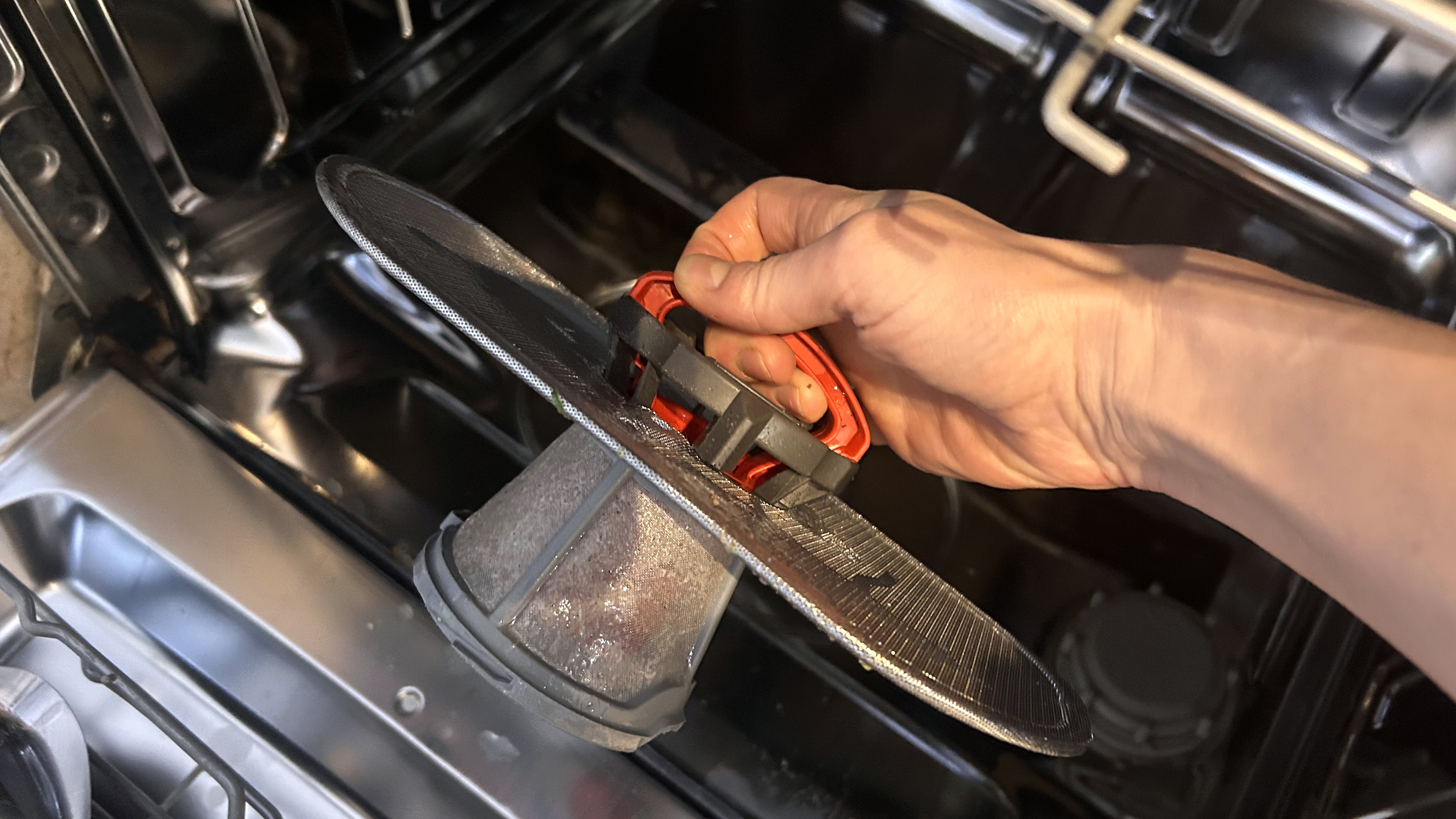
Your dishwasher's filter traps food debris, and if it’s not cleaned regularly, it can start to smell pretty foul. Start by removing the filter, which is usually located at the bottom of the dishwasher.
Rinse it thoroughly under warm water, using dish soap and a soft brush to remove grease and grime.
If the filter is particularly dirty, soak it in warm, soapy water for about ten minutes before scrubbing. Once it's clean, reinstall the filter, making sure it's securely in place before moving on to the next step.
4. Check and clean the drain
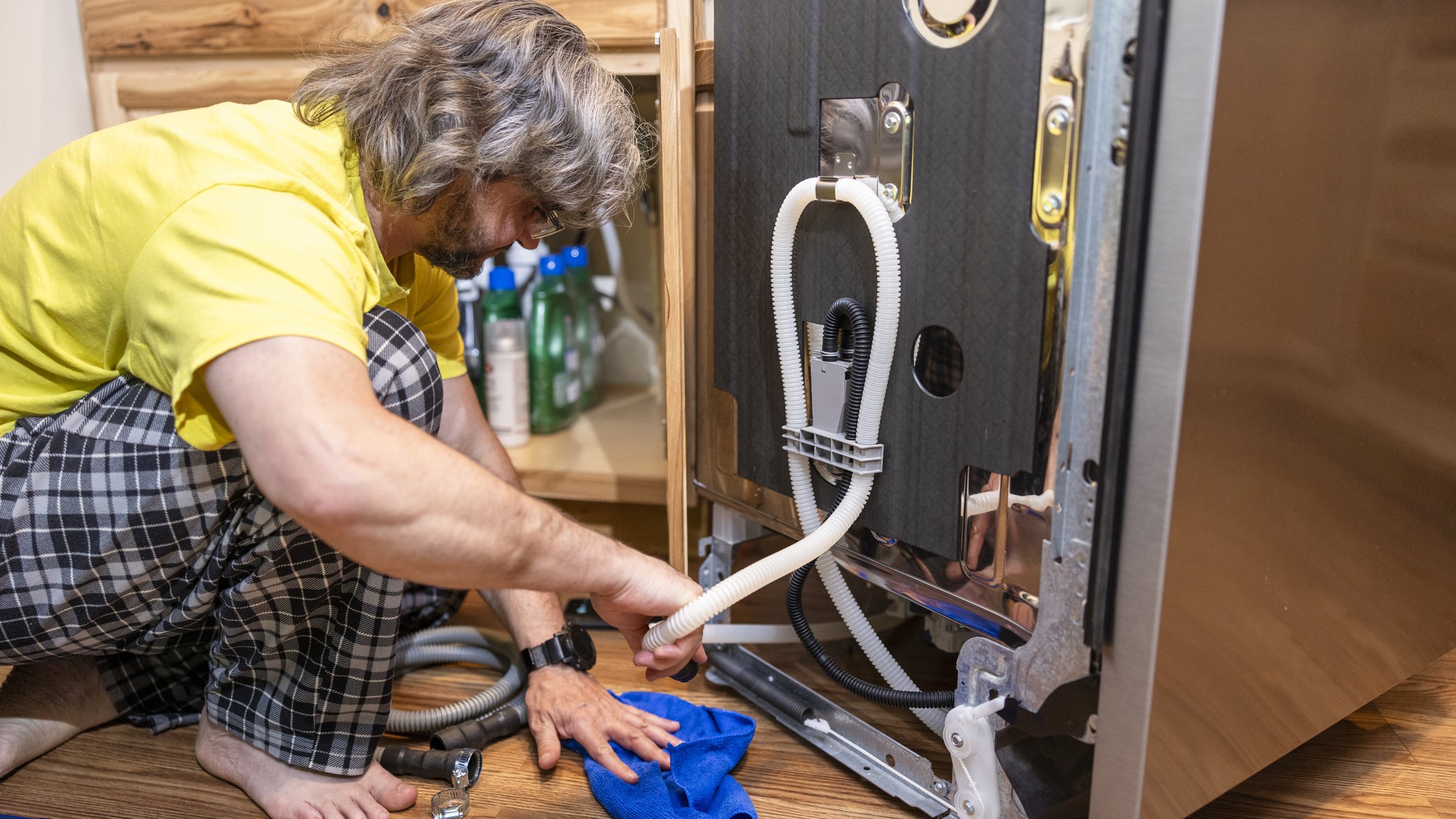
A clogged drain can cause odors and prevent proper drainage. Begin by removing any visible food scraps or debris around the drain. Use a toothpick, brush, or wet/dry vacuum to clear any blockages. If you can access the drain hose, check for buildup and flush it gently with warm water to keep it clear.
5. Clear the spray arms
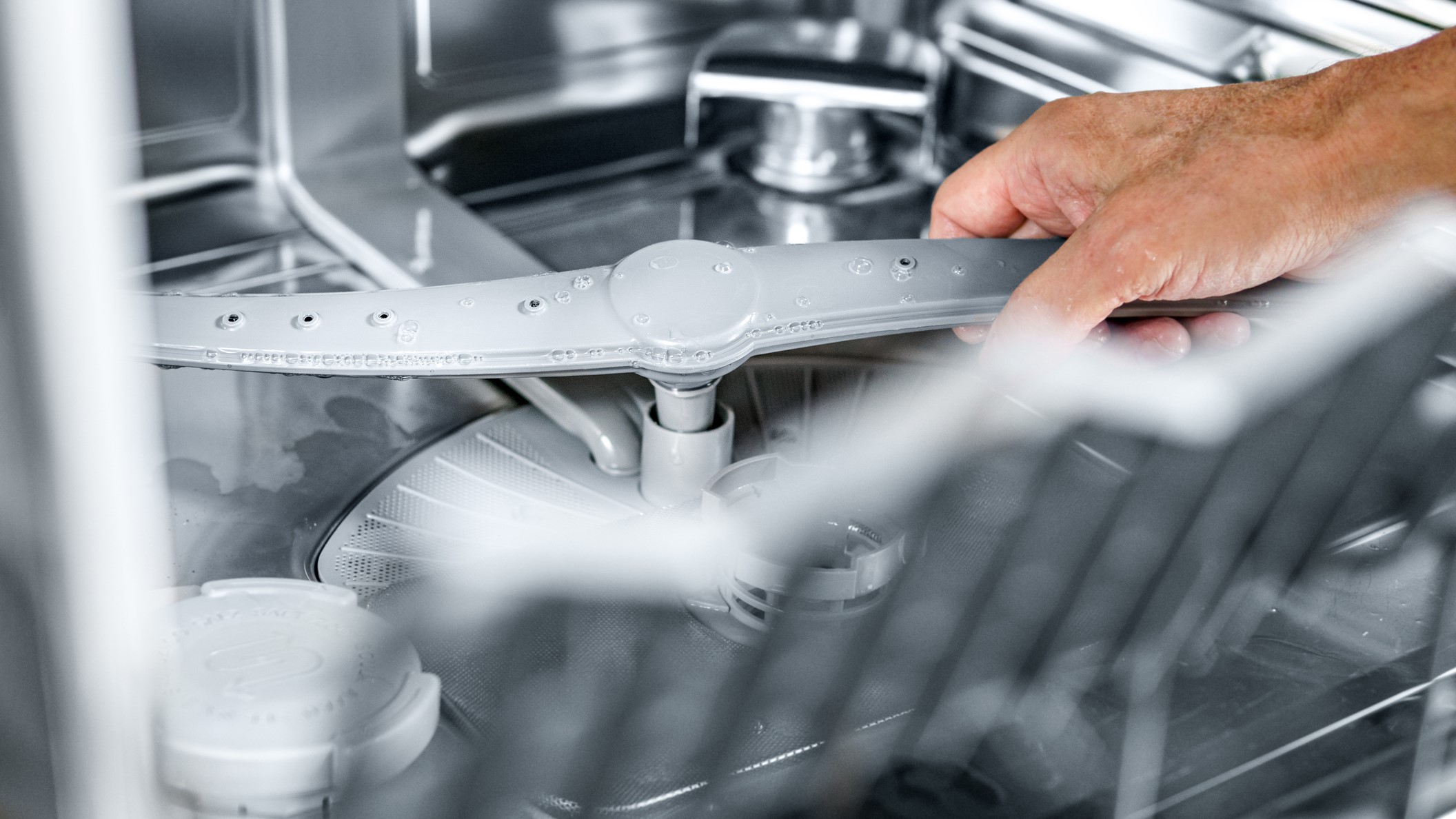
The spray arms distribute water during a wash cycle, but food particles can get trapped if they become clogged, leading to unpleasant smells.
Cleaning guru Elizabeth Shields recommends removing the spray arms and rinsing them in warm water. "Then, clean blocked holes with a toothpick or a small brush," says Shields. Once they're clean, reattach them securely before moving on.
Elizabeth Shields is the Operations Manager at Super Cleaning Service Louisville, a professional cleaning company based in Louisville, Kentucky. Aside from being a manager, Elizabeth showcases her diverse expertise as an author of online articles. Her writing prowess spans across a wide array of subjects, from insightful parenting advice to enlightening pieces on home improvement, wellness, and the topic of sustainability.
6. Wipe down the interior
"Grease and grime can build up on the interior walls, the racks, and the door gasket, which clings to moisture and bacteria," says appliance expert Lindsay Zollman. "Ignore it too long, and you’ve got musty mold."
Use a damp microfiber cloth or sponge with warm, soapy water to wipe down the entire interior. Pay special attention to the door gasket, the rubber seal that lines the door, as this area is prone to mold and mildew growth. For stubborn grime, use a toothbrush or soft brush to scrub hard-to-reach areas.

Lindsay Zollman is a Senior Consumer Analyst at Hisense with three years of experience in home appliances. She specializes in understanding how consumers shop for and use their appliances, helping them get the most out of their products. Her work supports Hisense's mission to deliver high-quality, innovative, and affordable home technology that makes everyday life easier.
7. Run a vinegar cycle

Shields swears by white vinegar for breaking down grease and eliminating bacteria that cause odors. "Run a cleaning cycle with a cup of distilled white vinegar on the top rack," says Shields.
Then run a hot water cycle without any detergent or dishes. The vinegar will work to cut through buildup and neutralize any lingering bad smells.
8. Run a baking soda cycle
Baking soda is perfect for absorbing odors and giving your dishwasher a fresh, clean scent. After the vinegar cycle is complete, Shields recommends sprinkling one cup of baking soda across the bottom of the dishwasher. Then run a short, hot water cycle without detergent or dishes. This will help eliminate any remaining smells and leave the interior of your dishwasher smelling fresh.
Appliance expert Lindsay Zollman also recommends adding a natural lemon scent. "Pop a few slices in the silverware basket before running a cycle to leave a fresh citrus scent!"
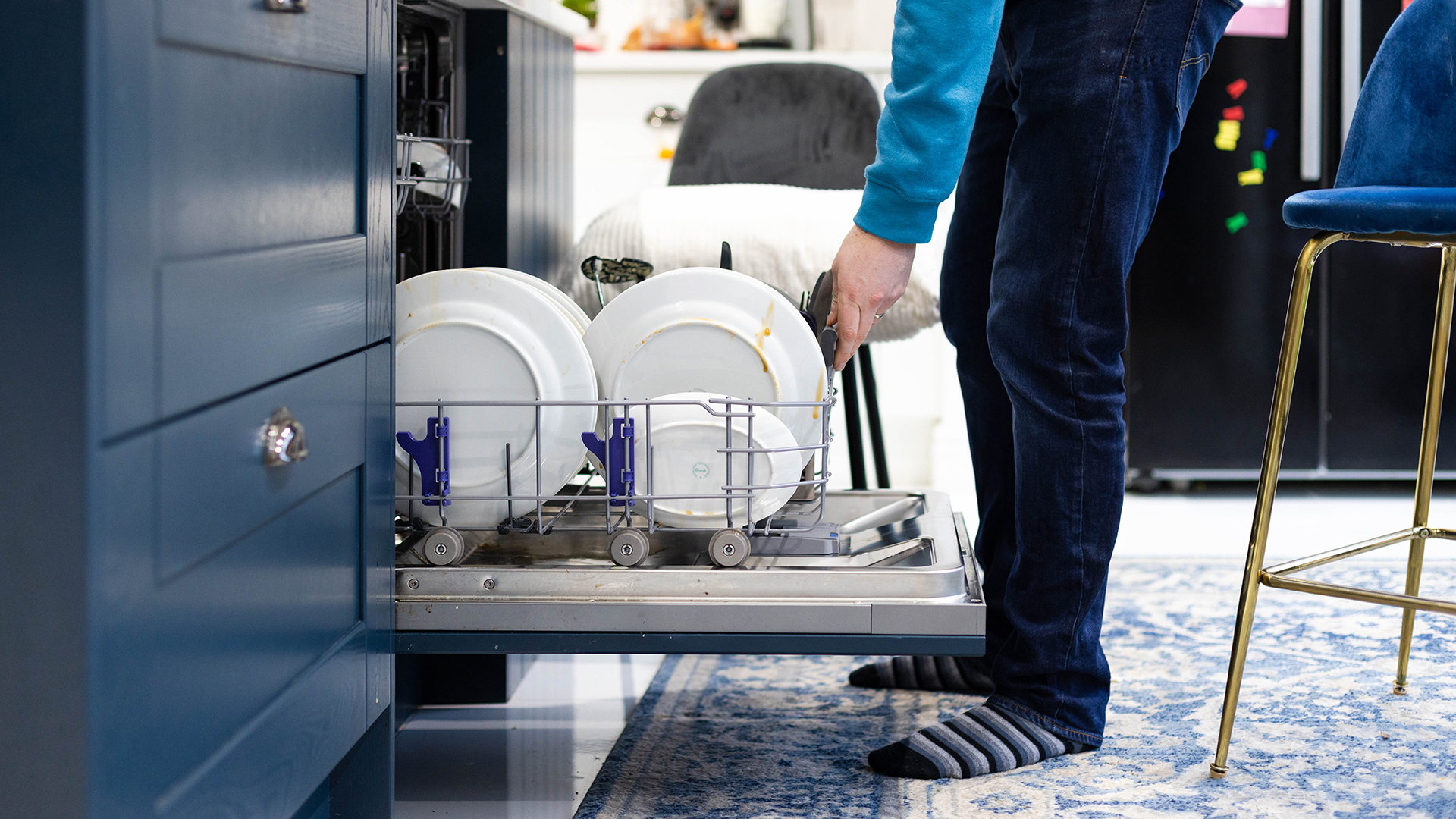
How to unclog a dishwasher: FAQs
What causes dishwasher odors to develop?
According to Zollman, there are several reasons why a dishwasher can start to smell. Here are her top culprits:
- Leftover food particles: Bits of food can get stuck in the filter, spray arms, or along the edges of the door, which can break down and create an unpleasant smell over time.
- Grease and grime buildup: Grease from dirty dishes can stick to the inside of the dishwasher, which gives bacteria and mold a place to grow.
- Hard water deposits: If you have hard water, minerals can build up inside the dishwasher, which can trap odors.
- A clogged or dirty filter: The filter catches food debris, but if it’s not cleaned regularly, it can start to cause a smell.
- Mold and mildew: If moisture gets trapped inside the dishwasher, it can lead to mold and mildew growth which causes a musty, unpleasant odor.
- Sewer gas issues: In rare cases, a bad smell could be coming from a plumbing issue like sewer gas backing up into the dishwasher.
Many of the experts I spoke to also identified an unusual cause of bad odors in a dishwasher - using too much detergent. "Excessive detergent can leave a residue that traps bacteria, causing odors over time," says appliance expert Glenn Lewis.
"You’d think more detergent would give you cleaner dishes, but it actually has the opposite effect," says Shields. When there’s too much detergent, it leaves a sticky residue in your dishwasher, blocking it up and trapping grease and food bits. Over time, that buildup creates a bacteria-friendly environment, and that's when the smell starts. So, stick with the right amount. If you see a filmy or greasy layer inside, run a cycle with vinegar."

Glenn Lewis was named president of Mr. Appliance, North America’s leading appliance repair franchise providing customers with full-service residential and light commercial appliance repair, in May 2024. He is responsible for the overall leadership and growth of Mr. Appliance throughout the US and Canada.
Is there any way to prevent a dishwasher from developing odors?
Experts agree that keeping a regular daily, weekly, monthly, and annual maintenance routine can avoid the risk of returning dishwasher odor. Shields has shared her simple but effective maintenance schedule with me. Here's how to do it:
- Daily: Scrape dishes before loading and leave the dishwasher door slightly ajar after the washing cycle.
- Weekly: "Wipe down the interior walls and the door gasket because food and grease love to hide there," says Shields. She also recommends scrubbing the racks and drain filter. "A lot of people just clean the inside, but the filter’s where all the food waste builds up, and that’s usually causing the stink."
- Monthly: Shields suggests running a cleaning cycle with a cup of distilled white vinegar on the top rack and following it up by sprinkling a cup of baking soda in the bottom and running a short cycle on the hottest setting. "If you prefer using a store-bought product, go for Affresh Dishwasher Cleaner," says Shields. "Put one tablet in the bottom of your empty dishwasher and run a normal cycle with hot water. Once a month is good for maintenance, but if you’ve got heavy buildup or complex water issues, go for every two weeks."
- Annual: "Once a year, remove the spray arms and rinse them in warm water," says Shields. "Then, inspect the drain hose for clogs. Disconnect the hose and run it under hot water to remove any buildup. Next, thoroughly clean every surface in the interior, including the walls, racks, and door gasket, with warm water and mild dish soap. Follow with a vinegar cycle and a baking soda rinse to cut through whatever grease remains. Do this at least once a year or quarterly to keep things running smoothly."
Final thoughts
To keep your dishwasher smelling fresh, a little maintenance goes a long way. By regularly cleaning the filter, wiping down the interior, and running vinegar and baking soda cycles, you can prevent grease, grime, and food particles from building up. Even small daily habits like scraping off food before loading dishes and leaving the door slightly open after a cycle can also help stop morsels and moisture from turning into musty odors.
If your dishwasher develops a persistent smell, don’t ignore it—tackle the issue before it gets worse. Checking for clogs in the drain, spray arms, or filter can make a big difference, and using natural cleaners like lemon, vinegar, and baking soda is an easy way to keep your appliance fresh. With a little effort, your dishwasher can stay odor-free and ready to give you sparkling clean dishes every time.
